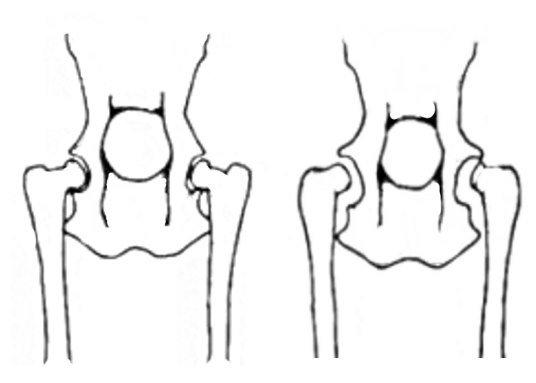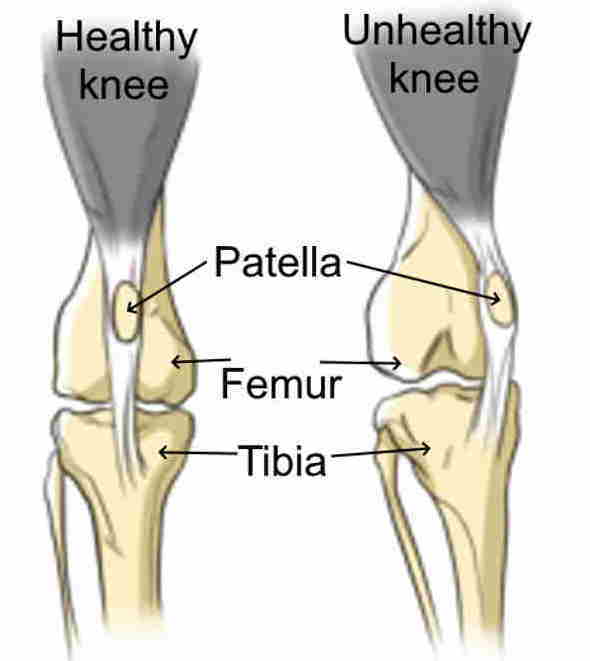Do Small Dogs have Joint Problems?
BY MOLLY | EVERYTHINGSHIHTZU.COM
A big part of being a pet parent is being aware of any health issues, genetic or otherwise, that your dog might be predisposed to.
If you know what conditions your small dog is more susceptible to, or which issues are more prevalent within a particular breed, then you can be more proactive with the care of your pet.
Many people, myself included, were under belief that small dogs like the Shih Tzu, do not have joint problems or that only larger boned dogs will have these issues. But unfortunately, this just isn’t true.
 Joint problems in small dogs
Joint problems in small dogsWhen it comes to joint problems, a small dog can sometimes develop conditions like hip dysplasia and patellar luxation. Hip dysplasia is when there is looseness in the hip joint, usually due to improper formation, and patellar luxation is when the kneecap slips in and out of place.
Both of these problems can cause other issues such as arthritis and joint pain.
Although Shih Tzu are a pretty healthy small dog breed; hip dysplasia and patellar luxation can occur, especially if the breeder did not properly screen for these conditions.
However, this in no way means that all "lion dogs" will acquire these issues.
Simply knowing that there is a possibility for your pup to develop these conditions already puts you ahead of the game and can make it easier for you to help your dog.
Are Shih Tzu More Likely To Have Joint Problems?
Shih Tzu are not necessarily more likely to develop joint problems; it really all depends on the breeding.
Hip dysplasia is an inherited condition, so a lot hinges on your pup’s parents and if the breeder paid attention when screening dogs.
If you go to a reputable breeder, then most likely he carefully screened his canines before breeding to help phase out potential conditions.
Plus, although hip dysplasia can occur in small dog breeds, it is more often seen in larger breed dogs.
Patellar luxation, when the kneecap slips in and out of place, can be inherited, it can develop over time, or it can even be caused by an accident or injury.
This is actually a pretty common issue across multiple dog breeds and is not just exclusive, or more common, for Shih Tzu.
How Does hip dysplasia affect small dogs?
 Hip Dysplasia in small dogs
Hip Dysplasia in small dogsIn healthy dog hips, the ball (top part) of the leg bone fits snuggly into the hip socket.
In the slight gap between the hip socket and ball of the leg bone is a thin layer of cartilage. The cartilage acts as a cushion keeping the ball and socket from rubbing together so it can move freely.
Hip dysplasia is a condition in which the ball and socket of the hip joint do not properly develop, causing looseness in the joint and a grinding motion instead of smooth movement.
Over time, this condition can lead to painful and severe issues, including complete loss of use of the joint.
Although it is an inherited condition, it can be exacerbated by poor nutrition and exercise habits that lead to weight gain, which can make the condition worse.
How Does Patellar Luxation affect a small dog?
 patella luxation in dogs
patella luxation in dogsPatellar luxation is a condition in which the kneecap slides in and out of place because it slides out of the femoral groove (located in the thigh bone) when the knee bends.
It can either move to the outside or the inside of this groove, causing varying degrees of discomfort and pain, and affecting your dog’s mobility.
This condition is one of the most common orthopedic problems that dogs face, especially for small dog breeds.
It is in part genetic and in some cases, it can also be caused by an injury to the knee.
Roughly half of the dogs with patellar luxation experience it in both knees.
What Are The Signs Of Joint Problems?
Knowing the signs of possible joint problems can help you seek out care early on which can make a major difference in your Shih Tzu’s quality of life.
Early treatment of joint issues can help slow down deterioration and also help prevent possible further injury, especially since you will be better equipped to care for your pup.
If you notice any of the following signs in your canine pal, have her checked out by your vet as soon as possible:
- Reduced mobility or slowing down, it's probably not just because your dog's "getting old"
- Limping or favoring certain limbs
- Hesitant to go up or down steps
- Doesn't enjoy playtime or walks as much
- Irritable
- Yelps or whines when touched on or near a joint area
- Doesn't want to be picked up
- Spends a lot of time sleeping
- Reluctant to jump
- Constantly licks a joint area
- Hops when running
- Has swelling or tenderness near joints
Can Joint Problems in a Small Dog be prevented?
Obviously, if your dog starts to develop joint problems you can't prevent them.
However, you can do several things to prevent them from getting worse or at least slow down their progression.
When it comes to ways to help your dog maintain healthy joints, here are several good practices:
- Make sure your pup gets adequate exercise
- Provide your dog with a nutritious diet
- Don't let your dog jump from high distances
- Make sure your pup maintains a healthy weight
- If you have a young puppy, make sure she doesn't jump too high or over-exercise while her joints are still forming; this can lead to issues, like arthritis, later in life
- Treat any injuries as soon as possible
- Talk to your vet about a dog supplement that helps encourage healthy joints
- Get regular well-visits and screenings for your pet
What Can be done for a dog with Joint Problems?
If your vet diagnoses your pet with hip dysplasia, patellar luxation, or another joint issue, the best thing to do is to begin treatment and care as soon as possible.
Early intervention can help slow down the progress of the condition and help make your dog more comfortable.
Here are some things to keep in mind in order to help a small dog with joint problems:
- Get a thorough evaluation from your vet
- Discuss anti-inflammatory medications that might help ease your dog's pain
- Ask your vet for advice on a good joint supplement to help strengthen your pup's joints
- Provide a comfortable, accessible environment for your pet. For example, keep his toys and bed on the floor so he does not need to jump
- If your pup is overweight, place him on a diet. Losing weight can significantly improve your dog's situation
- Consider if rehabilitation therapy or other treatments, like laser therapy, might be good options for your dog
- Ask your vet if surgery might be an option; discuss the pros and cons (and costs)
As with everything when it comes to your canine family, knowledge is power, and early intervention is critical.
Always stay in tune with your pup's behavior and habits so you can quickly spot when something seems out of the ordinary.
The better you know your dog, the healthier and happier he'll be.



